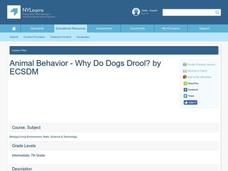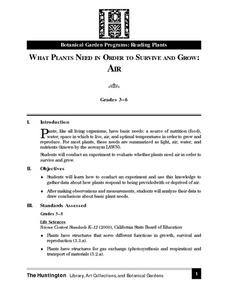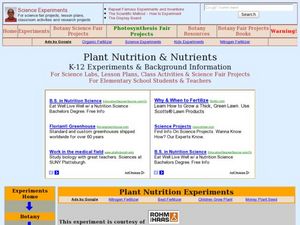Curated OER
Animal Behavior - Why Do Dogs Drool?
Seventh graders give examples of learned behaviors. In this life science lesson, 7th graders simulate a behavior conditioning experiment. They complete an assessment at the end of the lesson.
Curated OER
Out of the Deep
Students observe, describe, and record characteristics of ocean animals (mammals and fish) and sea shells. They conduct an experiment comparing and contrasting sugar water, salt water and fresh water and create a mural of coral reef...
Curated OER
The Way a Tree Works
Students explore nature by conducting botany experiments. In this plant life lesson, students define the necessary resources for a plant to thrive on our planet while defining scientific vocabulary terms. Students utilize different plant...
Curated OER
Animals
Second graders define and describe the characteristics of a mammal and a mammal's importance to man. They also describe the life cycle of a frog and compare and contrast a larva and an adult frog. Finally, 2nd graders study and explain...
Curated OER
Pond 2: Life in a Drop of Pond Water
Students observe organisms found in pond water with a microscope. In groups, they discuss how single-celled organisms satisfy their needs for food, water and air. They compare and contrast the needs of macroscopic and microscopic...
Curated OER
THE SCIENCE OF MUMMIES
Students explore how new advancements in technology can lead to advancements in scientific knowledge, and specifically how new technologies are advancing the study of mummies.
Curated OER
The World of Insects and Spiders
Students identify numerous insects and their body parts. For this insect life lesson, students practice using scientific vocabulary while comparing the different parts of spiders and insects. Students view several videos...
Curated OER
Flour Beetles
Students observe life stages in flour beetles and graph the results. They write a summary report.
Curated OER
Make A Mummy: The Science of Mummification
Learners research the history of mummification. They work together to create an apple mummy. They write a paragraph about what they gathered while doing the experiment.
Alabama Learning Exchange
Peeking At Pumpkins
Young scholars listen to a read aloud about the life cycle of the pumpkin and discuss the process. They complete a life cycle booklet.
Curated OER
What's in the Water?
Young scholars examine how pollutants can affect ocean animals. In this pollution lesson, students read a story about the ocean floor, think about what would happen to the plants and animals if the ocean became dirty or polluted, and...
Curated OER
Introduction To Seasons
The purpose of this lesson is to introduce the students to a unit on seasons. The Students will learn how to navigate a PowerPoint presentation. They will use the PowerPoint presentation to take a pre test in order to determine the prior...
Curated OER
What Plants Need in Order to Survive and Grow: Air
Students conduct an experiment to determine whether plants need air in order to survive and grow. They discuss natural resources, analyze slides, and observe and record data from the experiment.
Curated OER
Plant Nutrition and Nutrients
Students observe seeds growth and examine the different parts of the seedling. In this biology lesson, students compare the growth of seeds planted in soil and in hydroponics. They record their observations in their science journal and...
Curated OER
Bacteria: The good, the bad, the ugly
Seventh graders conduct an experiment. In this bacteria lesson, 7th graders list living and nonliving things and brainstorm the characteristics they share. Students are divided into two groups where they put samples of hand...
Curated OER
What Plants Need in Order to Survive and Grow: Light
Students conduct an experiment to evaluate whether plants need light to survive and grow. They observe and gather data about plant responses to different growth regimes, analyze the data, and make conclusions about basic plant needs.
Curated OER
What Plants Need in Order to Survive and Grow: Soil
Students conduct an experiment to evaluate whether plants need soil to survive and grow. They plant two seeds, one with soil and one without, make predictions, and record and analyze the seed germination results on a worksheet.
Curated OER
Environment: The River Classroom
Seventh graders engage in hands-on experiments and activities dealing with rivers and greenways. They also observe lectures and demonstrations by experts in water and river restoration. Students and teachers participate in canoe trips...
Curated OER
A Constructivist Version of the Snail & Elodea Lab
Learners explain the importance of having a control when setting up an experiment.
Curated OER
Insect Monitoring
Students practice the scientific method in the classroom, either in preparation or as a substitution for real-world field experience. They examine a simulated biodiversity research situation, using a "mini-plot" or
sampling square...
Curated OER
Freshwater Fish Water Quality
Sixth graders work together to complete an experiment about the quality of freshwater. In groups, they collect fresh water samples from a variety of sources and test the pH levels. After completing a KWL chart, they test the amout of...
Curated OER
Whst Makes You Tick?
Eleventh graders explore the major organs of the circulatory system. In this circulatory system lesson, 11th graders create, identify and describe parts of the system. Students view a list of major organs and predict what their job is....
Curated OER
Stream Table
Learners explore channelization, riparian habitats and soil erosion to find out about the aquatic habitats in Iowa. In this aquatic habitats lesson, students define important terms and read an article about pollution. ...
Curated OER
Walking For Water
Students investigate how third world countries get their water. In this water lesson, students research how countries like Kenya and Ethiopia get their water supply. Students participate in an experiment to role play how difficult it is...























